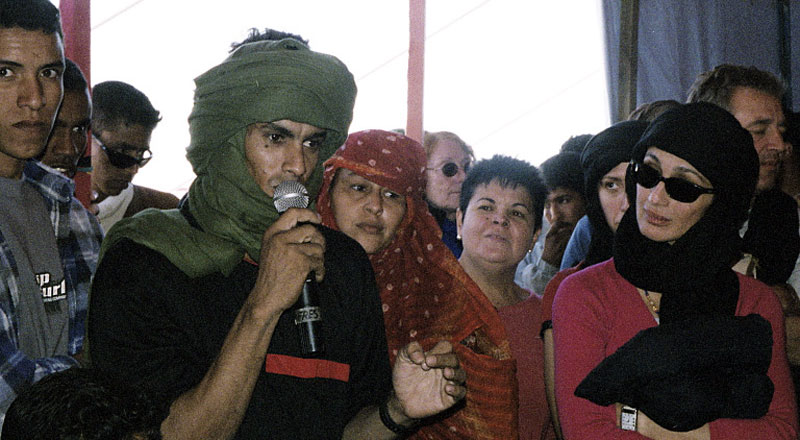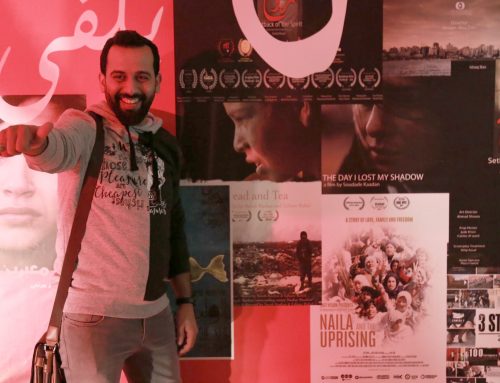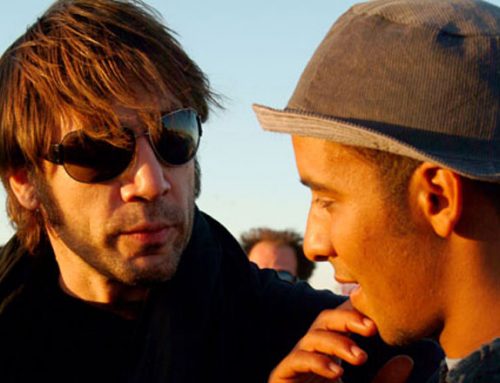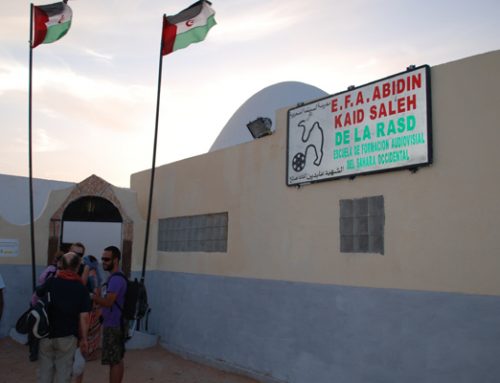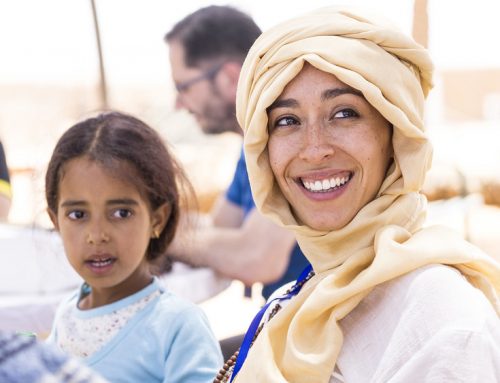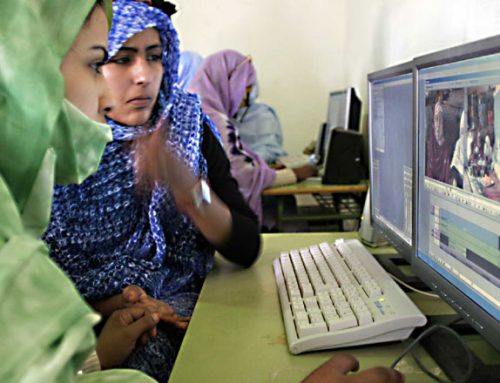It’s difficult to talk about FiSahara and the Sahrawi cause without, in the same breath, discussing their strong connection to Cuba and the multiple ways in which this Caribbean nation and its people have shown their solidarity with the Sahrawi people. Cuba has not only supported Western Sahara politically by recognizing its government-in-exile (the Sahrawi Arab Democratic Republic or SADR) and rejecting Morocco’s illegal occupation; its high schools have also hosted hundreds of Sahrawi students and its universities have provided higher education for young Sahrawis in critical areas such as medicine, education and technical careers. Today, anyone who visits the Sahrawi refugee camps is likely to run into a Sahrawi who speaks Spanish with a Cuban accent and has fond memories of life on the island.
In addition to offering degrees such as in Oceanographic engineering — yes, in the camps you can also run into a Sahrawi trained in this field who lives thousands of miles from the nearest coast — Cuba also opened a critical door to cinema studies for a people whose culture is heavily based on oral tradition through its prestigious International Film and Television School (EICTV) in San Antonio de los Baños.
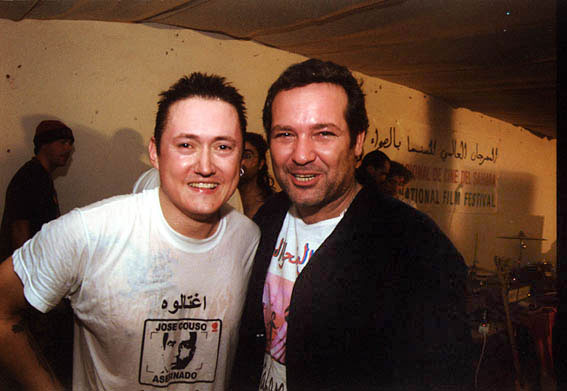
The Basque singer Fermín Muguruza and Perugorría in FiSahara 2003 (Gª Poveda)
Cuban filmmakers have been coming to FiSahara since its first edition in 2003, when director Fernando Pérez screened his poetic Suite Habana and visiting actor Jorge Perugorría was privy to Sahrawis’ Cuban accents. Known as Cubarauis, Sahrawis who have spent all their high school and university years in Cuba — about half their lives — often speak about their nostalgia for the land and the people they got to know so well and that gave them so much.
Perugorría, known for his lead roles in Strawberry and Chocolate and Guantanamera, took his camera with him to FiSahara and shot a film called Caribbeans in the Sahara. It aired on Cuban television, and many Cubans learned for the first time about Cuba’s strong connection to Western Sahara.
In 2006 FiSahara dedicated its third edition to Cuba, celebrating three decades of solidarity and South-South cooperation through educational scholarships and other support. The festival’s special Cuba section screened Havana Blues, Guantanamera, Strawberry and Chocolate and Waiting List, hosting film stars Yoima Valdés, Vladimir Cruz and Roberto Sanmartín.
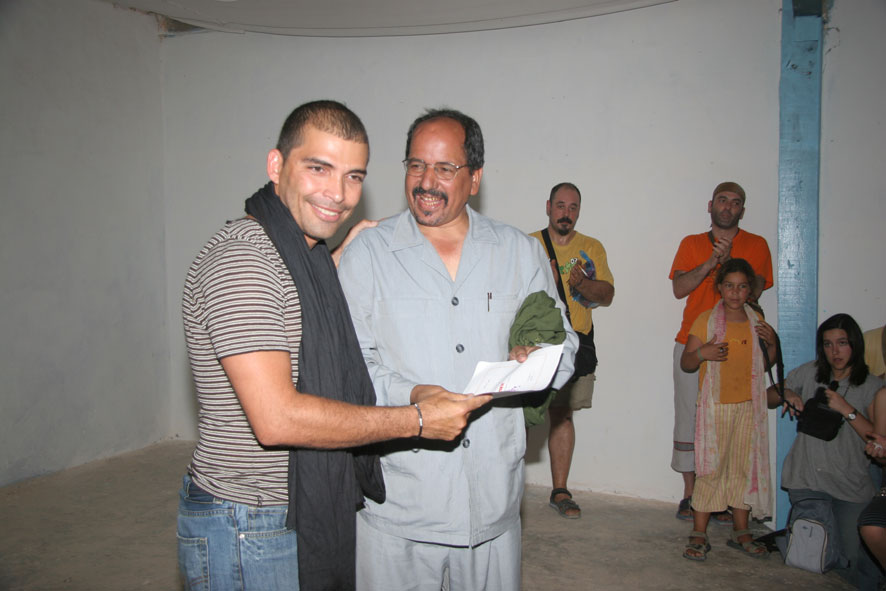
The Cuban actor Vladimir Cruz with the president of the SADR Mohamed Abdelaziz (Ángel Trotter)
Sahrawi filmmaker Ahmed Omar, who spent three years studying film in Cuba, is an example of the strong connection between Cuba and Western Sahara. Dressed in a regal darra, a traditional Sahrawi robe, and carrying the flag of his homeland, Ahmed graduated from International Film and Television School a few years ago after making films such as Portrait, screened at the Lausanne African Film Festival. He continues to make films and is now teaching editing at the Abidin Kaid Saleh Audiovisual School in the camps.

The Uruguayan journalist and writer Eduardo Galeano in FiSahara 2006 (Iker Amas)
FiSahara’s connection to Latin America extends well beyond Cuba. In 2011 the festival was dedicated to Venezuelan cinema, and renowned Uruguayan writer Eduardo Galeano visited in 2006, becoming a strong supported of the cause. Galeano, known for his book The Open Veins of Latin America, wrote Walls after witnessing Western Sahara’s 2.700km-long separation wall built by Morocco — the world’s longest after the Great Wall of China. An excerpt:
“And the Moroccan Wall, which for twenty years has perpetuated Morocco’s occupation of Western Sahara, goes unmentioned altogether. This wall, continuously mined and surveilled by thousands of soldiers, is sixty times longer than the Berlin Wall.
Why is it that some walls are so vocal and others are so mute? Would it be because of the walls of uncommunication that the major media erect each day?”
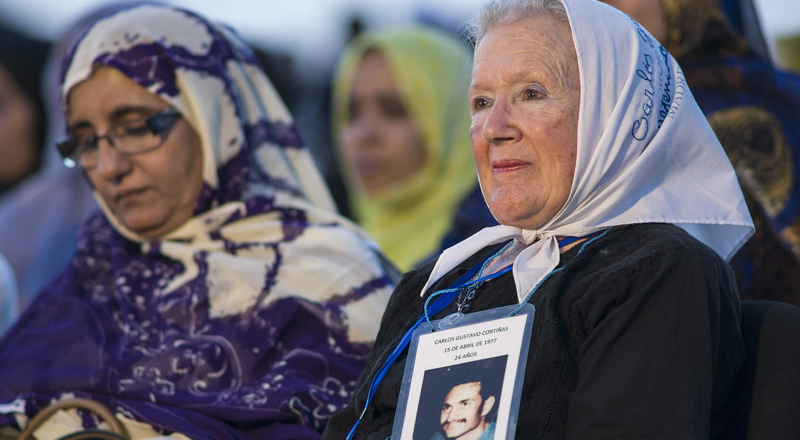
Culture Minister Khadidja Hamdi and Nora de Cortiñas (Carlos Cazurro)
In 2015 Nora de Cortiñas, co-founder of the Mothers of the Plaza de Mayo in Argentina, stood beside that wall while visiting FiSahara, a photograph of her disappeared son, Gustavo, around her neck. While at the festival she met other mothers of the disappeared, from Western Sahara, and was hosted by one of them.
FiSahara’s films have travelled to many festivals and cinemas in Latin America — Festival Ojo al Sancocho in Ciudad Bolivar (Bogotá, Colombia), Festival Audiovisual Montes de María (Colombia) and Uruguay’s International Film School Festival among others. As FiSahara embarked on its international journey in 2013, more were to come.

